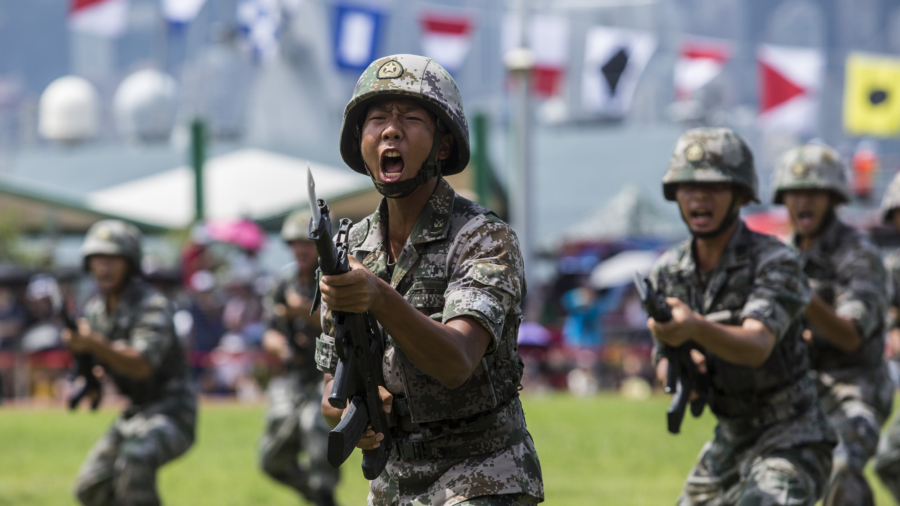Hong Kong protests against the Chinese Communist Party’s control continues into its eighth consecutive week. China’s People’s Liberation Army’s (PLA) garrison in Hong Kong released a video showing footage of “anti-riot” exercises, raising concerns of potential military intervention from the regime during Hong Kong’s political crisis.
The three-minute video published on July 31 shows troops advancing with shields, firing rifles into the air and using tear gas and water cannons against protesters.
Tanks and missiles are also depicted in the scenes.
"All consequences are at your own risk." – This phrase, spoken in the Cantonese dialect used in Hong Kong, has featured in anti-riot drills the Chinese army conducted. https://t.co/Z5rtITYPV6 pic.twitter.com/1giaKVotd9
— SCMP News (@SCMPNews) August 1, 2019
Hong Kong returned from British to Chinese rule in 1997 with a promise of democracy and free speech under the “one country, two systems” principle. The waves of protests started in June. They were triggered by an extradition bill that would allow Hong Kong to send anyone to mainland China to face trial in communist-controlled courts.
Millions of Hong Kongers have taken to the streets in the subtropical city’s simmering summer.
The protests have continually broadened, into a movement that includes residents demanding direct elections; investigation of police brutality; and that the city’s leader, Carrie Lam—elected by a largely pro-Beijing committee—step down.
As the Hong Kong-based news outlet HK01 reported, Taiwan’s President Tsai Ing-wen said the release of the drill footage was an effort to scare and threaten Hong Kong residents. She called the move not smart and not responsible and said it will only further reduce the international community’s trust in the Communist regime.
Tsai also asked the Taiwanese people not to back off when facing pressure from the Chinese regime. She cited Hong Kong’s freedom—now encroached upon—as a possible future for Taiwan, a self-ruling island that China claims as its own territory.
An estimated 6,000 PLA soldiers are stationed in Hong Kong, but the troops have largely stayed behind the garrison.
Article 14 of the Basic Law, Hong Kong’s mini-constitution, allows Beijing’s army to intervene in Hong Kong’s affairs, but only under the request of the semi-autonomous city’s leadership and to maintain public order or help relieve a natural disaster.
A spokesperson for the Chinese regime pointed to the article when asked about Hong Kong in a previous press conference.
Despite the regime signaling several times that they may use force, local Hong Kong analysts say military intervention is still unlikely.
Bruce Lui, a senior journalism lecturer at the Hong Kong Baptist University, told HK01 that the drill is more about propaganda and to warn protesters. He said the possibility of military action from the PLA is “extremely low.”
Lui said China’s sending troops to Hong Kong would in effect announce the death of the “one country, two systems” model.
Commentary published on The Epoch Times‘s Chinese-language website said the ongoing U.S.-China trade war, and the Western world’s support for Hong Kong’s freedom, may make armed intervention too risky.
Its author, Dr. Wang Youqin—former member of the Chinese Communist Party’s Politburo Standing Committee—said, “If the Communist Party turns Hong Kong into a bloodshed, it will face severe sanctions from the U.S. and other Western countries. This equals suicide for the Communist Party.”
President Trump and Secretary of State Mike Pompeo have both appealed to Chinese leader Xi Jinping to “do the right thing” for Hong Kong.


